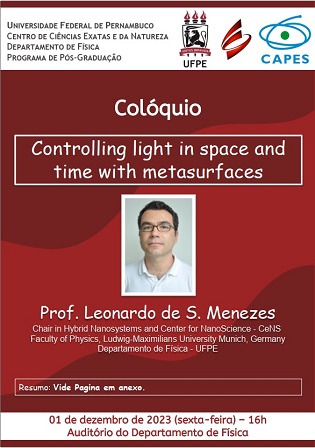Todas as Notícias
- UFPE/
- Institucional/
- Superintendências/
- Superintendência de Comunicação (Supercom)/
- Agência de Notícias (Ascom)/
- Notícias/
- Pós-Graduação em Física anuncia colóquio com o professor Leonardo Menezes
 Notícias Notícias
Notícias Notícias
Pós-Graduação em Física anuncia colóquio com o professor Leonardo Menezes
O evento ocorrerá às 16h nesta sexta-feira (1°)

O colóquio intitulado “Controlling light in space and time with metasurfaces” será realizado no auditório do Departamento de Física, localizado no Centro de Ciências Exatas e da Natureza (CCEN) do Campus Recife da UFPE. O evento terá início às 16h desta sexta-feira (1°) e contará com a participação do pesquisador e professor Leonardo de Souza Menezes, docente do Departamento de Física da UFPE, afiliado da Academia Brasileira de Ciências entre 2009 e 2014 e, atualmente, membro ordinário do CeNS (Centro de Nanociência da Universidade Ludwig Maximilians de Munique).
Resumo em inglês do evento
Photonics is the branch of science dedicated to creating and manipulating photons, exploiting their properties for example in the realization of physical processes and protocols, as well as detectors and sensors. Some years ago, photonics felt the need of a paradigm change, following the steps of electronics, in which extreme miniaturization is essential to make electronic circuits faster and energy saving. This miniaturization in photonics led to the field of nanophotonics, which aims the same as photonics, but at scales typically given by the wavelength of light, that is, a nanometric scale. One of the essential tasks of nanophotonics is to develop structures able to substitute bulky optical elements in devices and platforms that get smaller and smaller. In this framework, metasurfaces play an essential role, being already a reality. Metasurfaces are artificial bidimensional structures formed by subwavelength sized elements, called metaatoms (or metamolecules), aiming at locally controlling the amplitude and/or the phase of an incoming light beam such that the far-field resulting from the scattering of all illuminated metaatoms presents desired spatial and temporal dependences. The spatial tailoring of the resulting scattered far-field can be done by nanostructuring the metatatoms on the metasurface, while its temporal tailoring can be done, e.g., by using phase change materials to fabricate the metaatoms: one may significantly change the real and/or imaginary parts of their refractive index, thus changing their scattering properties and bringing tunability to the metasurface. In this colloquium, I will present the concept of metasurface, give some examples of applications, and discuss how a metasurface composed by nanodisks made from vanadium dioxide (a phase change material triggered by temperature) can be used to achieve a tunable metasurface in the visible range.
Mais informações
Programa de Pós-Graduação em Física
(81) 2126.7640/(81) 2126.8449
posgrad.df@ufpe.br





